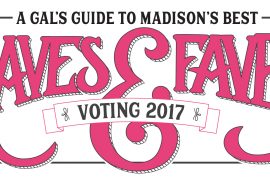EQUITY ROCKS
ANGELA RUSSELL JUST THINKS YOU SHOULD KNOWAngela Russell’s parents both hail from the Deep South. But their backgrounds diverge. Her father, the first of his family to attend college, grew up poor on red dirt roads in Alabama. In Louisiana, her mom was raised in a middle class family; all her siblings went to college. Both parents have been life-long community leaders and they each influenced Angela in different ways.
“My mom is the most voracious reader and consumer of information I’ve ever met. She’s smart and driven. She’s also spent her life battling lupus,” says Russell, who grew up in Peoria, Illinois. “My dad was an incredibly hard worker. Financial stability and being a provider for his family were the most important things to him.”
It’s no wonder Russell’s career started in public health and has led to her newest stint: working as CUNA Mutual Group’s manager of diversity and inclusion. And it’s no surprise that in her “spare time,” she created a popular Facebook group called Equity Rocks for others to learn and share about social justice issues.
“I often call myself an equity nerd,” she says with an infectious laugh. Russell’s professional path started between her sophomore and junior year of college with an internship at the state health department. That opened her eyes to huge health disparities between black and white women battling breast cancer. She’s spent time outside of work serving on Madison’s affirmative action committee, on a commission for civil rights and now on the Urban League’s board of directors. She’s worked for Public Health Madison and Dane County, the University of Wisconsin and other state departments.
CUNA Mutual recently created the diversity and inclusion position, and Russell will be the first to fill and shape it. “Inclusion is an important core value at CUNA Mutual. It’s not just a talking point. They want to act on it,” she says. She’ll still facilitate Equity Rocks. Started last summer, it’s grown to more than 450 members. In the context of shocking racial disparities in Madison, as evidenced by the “Race to Equity” report, the group is highly relevant and timely. It’s also thought-provoking and disquieting. “Equity Rocks can be touchy,” Russell says. “That’s part of the beauty of it. That’s how it gets real.
Posts to the group from a week in late-April included a study from The Washington Post on the most racist places in America, the writing of James Baldwin, and articles on the police shooting death of Tony Robinson. People post heartfelt comments and pose provocative questions. You won’t find any cat videos or funny memes. “For me, it’s been an incredible source of information that I use in my work,” she says, citing posts about a TED Talk by Verna Meyers, “How to overcome our biases? Walk boldly toward them,” and an article on white fragility.
For Russell, equity really does rock. So much so that we’re all compelled to have hard conversations and heartbreaking revelations to achieve equity. Recent highly publicized shooting incidents involving police, including Robinson’s death, are causing people to say, “We’ve got to do something,” says Russell. But systems and structures of racism are hundreds of years old in this country. “We have to sit with that. Race is not a biological concept, but the ramification of creating race as a concept has incredible consequences,” she says. “When we acknowledge our oppressive history and current systems and when see each other’s shared humanity, we can work together to dismantle gross inequities.”
Russell says in raising her two young, biracial children, she continues to be confronted daily with the challenges of inequity, but she’s inspired and fueled by her parents, and lots of local support, to continue her life’s work. “I love Madison to pieces. My question is how can we work together to make this a great place for everyone?”

